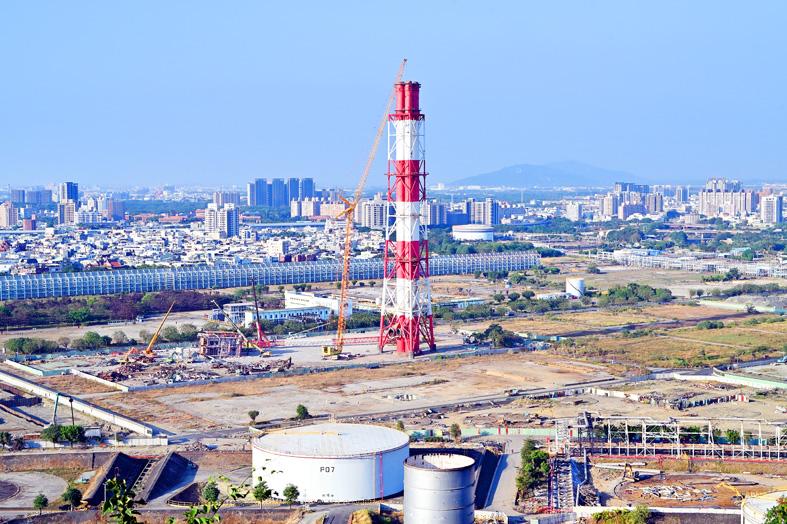The Kaohsiung City Government yesterday approved Taiwan Semiconductor Manufacturing Co’s (TSMC, 台積電) plan to build a new plant in the city, saying a second environmental review was not necessary.
The plant is to focus on making 7-nanometer and 28-nanometer chips, in line with rising demand from global customers.
The city government discussed for two hours environmental influences that would arise from TSMC’s plant and concluded that the world’s largest contract chipmaker met all requirements, rendering a second assessment unnecessary.

Photo: Ko Yu-hao, Taipei Times
TSMC is Apple Inc’s sole chip supplier. Its other major customers include Nvidia Corp, Intel Corp, Advanced Micro Devices Inc, Qualcomm Inc and MediaTek Inc (聯發科).
The COVID-19 pandemic has accelerated a global digital transformation as lockdowns in different parts of the world has led to a surge in demand for personal computers and other devices that connect to the Internet, the Hsinchu-based chipmaker has said.
Chip demand also picked up due to widespread use of online payment tools and the increasing popularity of electric vehicles, it said.
The planned TSMC facility has boosted housing prices in Kaohsiung by double-digit percentage points since its announcement in September last year.
TSMC has come up with plans to address the unfavorable side-effects of its manufacturing activity and has pledged to use solar energy sources, Kaohsiung officials said.
The new complex would cover 9.2 hectares of land and would cover a total of 12 hectares after factoring in greenery, the company said.
TSMC’s investment marks a concrete leap in the city government’s efforts to build a semiconductor corridor, it added.

CHIP RACE: Three years of overbroad export controls drove foreign competitors to pursue their own AI chips, and ‘cost US taxpayers billions of dollars,’ Nvidia said China has figured out the US strategy for allowing it to buy Nvidia Corp’s H200s and is rejecting the artificial intelligence (AI) chip in favor of domestically developed semiconductors, White House AI adviser David Sacks said, citing news reports. US President Donald Trump on Monday said that he would allow shipments of Nvidia’s H200 chips to China, part of an administration effort backed by Sacks to challenge Chinese tech champions such as Huawei Technologies Co (華為) by bringing US competition to their home market. On Friday, Sacks signaled that he was uncertain about whether that approach would work. “They’re rejecting our chips,” Sacks

NATIONAL SECURITY: Intel’s testing of ACM tools despite US government control ‘highlights egregious gaps in US technology protection policies,’ a former official said Chipmaker Intel Corp has tested chipmaking tools this year from a toolmaker with deep roots in China and two overseas units that were targeted by US sanctions, according to two sources with direct knowledge of the matter. Intel, which fended off calls for its CEO’s resignation from US President Donald Trump in August over his alleged ties to China, got the tools from ACM Research Inc, a Fremont, California-based producer of chipmaking equipment. Two of ACM’s units, based in Shanghai and South Korea, were among a number of firms barred last year from receiving US technology over claims they have

BARRIERS: Gudeng’s chairman said it was unlikely that the US could replicate Taiwan’s science parks in Arizona, given its strict immigration policies and cultural differences Gudeng Precision Industrial Co (家登), which supplies wafer pods to the world’s major semiconductor firms, yesterday said it is in no rush to set up production in the US due to high costs. The company supplies its customers through a warehouse in Arizona jointly operated by TSS Holdings Ltd (德鑫控股), a joint holding of Gudeng and 17 Taiwanese firms in the semiconductor supply chain, including specialty plastic compounds producer Nytex Composites Co (耐特) and automated material handling system supplier Symtek Automation Asia Co (迅得). While the company has long been exploring the feasibility of setting up production in the US to address

OPTION: Uber said it could provide higher pay for batch trips, if incentives for batching is not removed entirely, as the latter would force it to pass on the costs to consumers Uber Technologies Inc yesterday warned that proposed restrictions on batching orders and minimum wages could prompt a NT$20 delivery fee increase in Taiwan, as lower efficiency would drive up costs. Uber CEO Dara Khosrowshahi made the remarks yesterday during his visit to Taiwan. He is on a multileg trip to the region, which includes stops in South Korea and Japan. His visit coincided the release last month of the Ministry of Labor’s draft bill on the delivery sector, which aims to safeguard delivery workers’ rights and improve their welfare. The ministry set the minimum pay for local food delivery drivers at